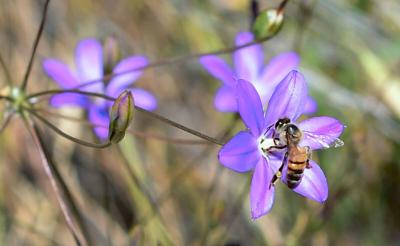A major new study conducted in Ontario and Quebec corn fields has found that neonicotinoids, a widely-used and controversial class of pesticides, hurt the health of honey bees, and comes as provincial, federal, and international regulators wrestle with reining in the use of these agrochemicals.
The Canadian research, led by biologists at York University, is published in the journal Science along with another ambitious study conducted in European fields. Together, they address a major gap.
“They are putting these bees into landscapes where farmers are really farming,” says Professor Nigel Raine, Rebanks family chair in pollinator conservation at the University of Guelph, who was not involved in the research. “The key message that’s coming out of both of them is that they found impacts on honey bee colonies. Previously that has not been found in the field, and that has been a source of confusion.”
Both honey bees and wild bees have suffered dramatic declines in recent decades. Bees are critically important pollinators for many crops and most wild flowering plants; estimates of the benefits they provide humans through these “ecosystem services” is measured in the tens of billions of dollars.
Lab experiments have shown that neonicotinoids — the most widely-used class of insecticide worldwide — have negative effects on bee life spans, foraging behaviour, the production of new queen bees, and other measures of health. But evidence from the real world has been scant and conflicting. Bees are beset by environmental ills, from climate change to loss of habitat.
“That’s where the controversy lies,” says Christy Morrissey, an ecotoxicologist at the University of Saskatchewan. “If you look at the lab studies, they’re highly conclusive. Neonicotinoids have a range of affects on all sorts of organisms, both honey bees and wild bees included. But when you start moving out into the field, you get messier responses.”
The two new studies sought to rectify this.
The Canadian group, led by York University’s Amro Zayed, studied five apiaries close to corn fields — four in Ontario and one in Quebec — and in six apiaries located far from agriculture, most in urban settings like Toronto and London. The researchers returned to 55 colonies across the 11 sites throughout the planting season, collecting dead and live bees, larvae, pollen and nectar.
The team found neonicotinoids in all the different types of samples from the sites near corn, especially in the pollen, and found them all throughout the growing season, a period of nearly four months. But most of the pollen brought back by the bees wasn’t coming from the treated corn or soy — it was coming from native plants surrounding the fields.
The next year, Zayed’s lab took honey bees housed at York’s research apiary and fed them pollen dosed with the “field realistic” levels of neonicotinoids they had observed the previous season. The exposed bees had life spans reduced by 23 per cent, were less likely to identify and remove diseased larvae, and were more likely to lose their queen. These combined effects can cause a colony to deteriorate.
Researchers also found that the toxicity of neonicotinoids nearly doubled when honey bees were exposed to them along with a commonly used fungicide, boscalid, which on its own did not affect the bees.
“You get a prescription from your doctor and there is a list of other medications you shouldn’t take,” says Zayed by way of comparison. “We go from bad — neonicotinoids on their own — to worse — neonicotinoids with the fungicide.”
The European study looked at how three bee species fared — the honey bee, bumble bee, and solitary bee — near 33 oilseed rape crops in Germany, Hungary, and the U.K.
The team found varied outcomes. Honey bees in Hungary exposed to one type of neonicotinoid were less likely to survive the winter, but in Germany fared fine. Bumblebees exposed to high levels produced fewer queens, while solitary bees produced fewer eggs. The geographic context seemed to play a role in what effects were observed, but most effects were negative.
Some critics called the European study “inconsistent.” But more praised the study, saying that variation is what you would expect in nature.
The EU placed a moratorium on the use of neonicotinoids in 2013 because of concern over the risks to bees and is weighing a total ban, which France has already announced.
In Ontario, nearly 100 per cent of corn seed and 60 per cent of soybean seed are sold pre-treated with neonicotinoids. Two years ago the province became the first jurisdiction in North America to curb the number of corn and soy field acres planted with neonicotinoid-treated seeds, aiming for an 80 per cent reduction by 2017. In 2016 the province reported a 24 per cent drop from 2014, well short of the target.
Health Canada’s Pest Management Regulatory Agency published a preliminary risk assessment on one neonicotinoid, imidacloprid, in January 2016 and found that it did not present an unacceptable risk to bees. Later that year, it did find risks to aquatic environments, and proposed phasing the agrochemical out over three to five years. Special reviews of two other neonicotinoids are underway.
“These are both very strong papers and will certainly have an impact,” says Morrissey.
“We think we’ve made that link between neonicotinoid exposure and declines in bee health very clear,” says Zayed.
“Yes, honey bees are exposed to sublethal doses of neonicotinoids for a long period of time, and that exposure has negative effects on bees.”













Anyone can read Conversations, but to contribute, you should be a registered Torstar account holder. If you do not yet have a Torstar account, you can create one now (it is free).
To join the conversation set a first and last name in your user profile.
Sign in or register for free to join the Conversation